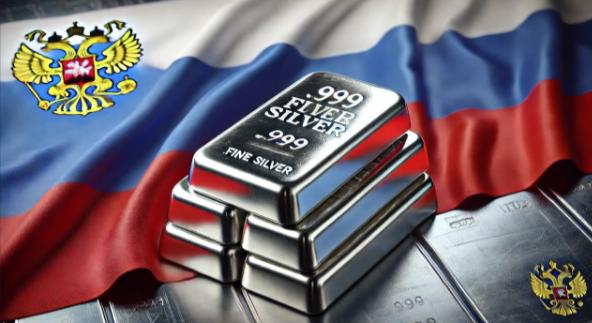
Russia reportedly plans to add silver and boost its gold, platinum, and palladium holdings in its state fund next year.
This would be the first time Russia has held silver in its state fund.
According to an Interfax report, the 2025 budget calls for an allocation of 51.5 billion rubles to buy precious metals and gemstones. This is a 32 percent increase from previously announced budget plans.
How much silver Russia plans to include in its precious metals strategy remains unclear.
According to a Jerusalem Post report, the move to increase precious metals holdings is “part of an ongoing response to economic sanctions that have isolated the country from the SWIFT banking system.
The SWIFT system serves as the global economy’s superhighway. In effect, it operates as a global financial messaging service, facilitating cross-border payments. Since the dollar is the world reserve currency, SWIFT effectively facilitates an international dollar system.
The United States has taken advantage of its privilege as the issuer of the world’s reserve currency, in effect, weaponizing the dollar for use as a foreign policy tool.
This has led to a movement in many countries to gradually minimize exposure to the dollar. This is a primary driver of ongoing central bank gold accumulation around the world.
As de-dollarization has accelerated, countries have primarily turned to gold as a reserve asset. Russia’s plan to include silver in its strategy is a new development.
According to the Post, “Russia has increasingly focused on diversifying its reserves with highly liquid assets, like gold. However, the mention of silver in this latest budget is significant, as it represents the first time any central bank has explicitly included silver in its purchasing plans during the current bull market for precious metals.”
The Post raises an interesting question: could silver follow the gold’s path?
“Gold, once treated with a degree of skepticism by some governments, has become a safe haven asset, particularly in times of economic uncertainty. Could silver follow a similar trajectory?”
Industrial offtake accounts for more than 50 percent of silver demand, but at its core, it is a monetary metal. The Post speculated that “silver’s dual role as both an industrial commodity and a potential financial asset could make it more attractive to governments seeking to hedge against economic volatility.”
Russia’s pivot to silver comes at a time when the metal seems to be underpriced, given the supply and demand dynamics.
Silver demand has outstripped supply for three straight years, and the Silver Institute projects another market deficit in 2024. This is primarily due to rapidly rising industrial demand, specifically in the solar energy sector.
In 2023, the silver market charted a structural deficit of 184.3 million ounces. The projection is for an even larger supply shortfall this year in the neighborhood of 215 million ounces. This would be the second-largest silver market deficit ever recorded.
Meanwhile, silver mine output has sagged since peaking in 2016.
If other countries follow Russia’s lead and begin holding silver, it could further strain supply and put more upward pressure on prices.